Childcare Assignment: Theories, Factors, and Needs of Children
VerifiedAdded on 2022/08/22
|9
|1328
|26
Homework Assignment
AI Summary
This assignment delves into various facets of child development, beginning with an exploration of early brain development and its significance. It then examines the importance of the early years for future educational success and provides an overview of developmental theories. The assignment analyzes two prominent child development theories: Erik Erikson's psychosocial approach and B.F. Skinner's behaviorist approach, providing summaries of their core concepts. It identifies and lists five factors that can contribute to poor early childhood development. The assignment also categorizes influences on child development as either biological or environmental. Furthermore, it defines symbol systems and patterns, providing examples of their use by children. Finally, it outlines six physical needs that education and care services must meet according to national regulations, and lists cognitive concepts affecting children's behavior.
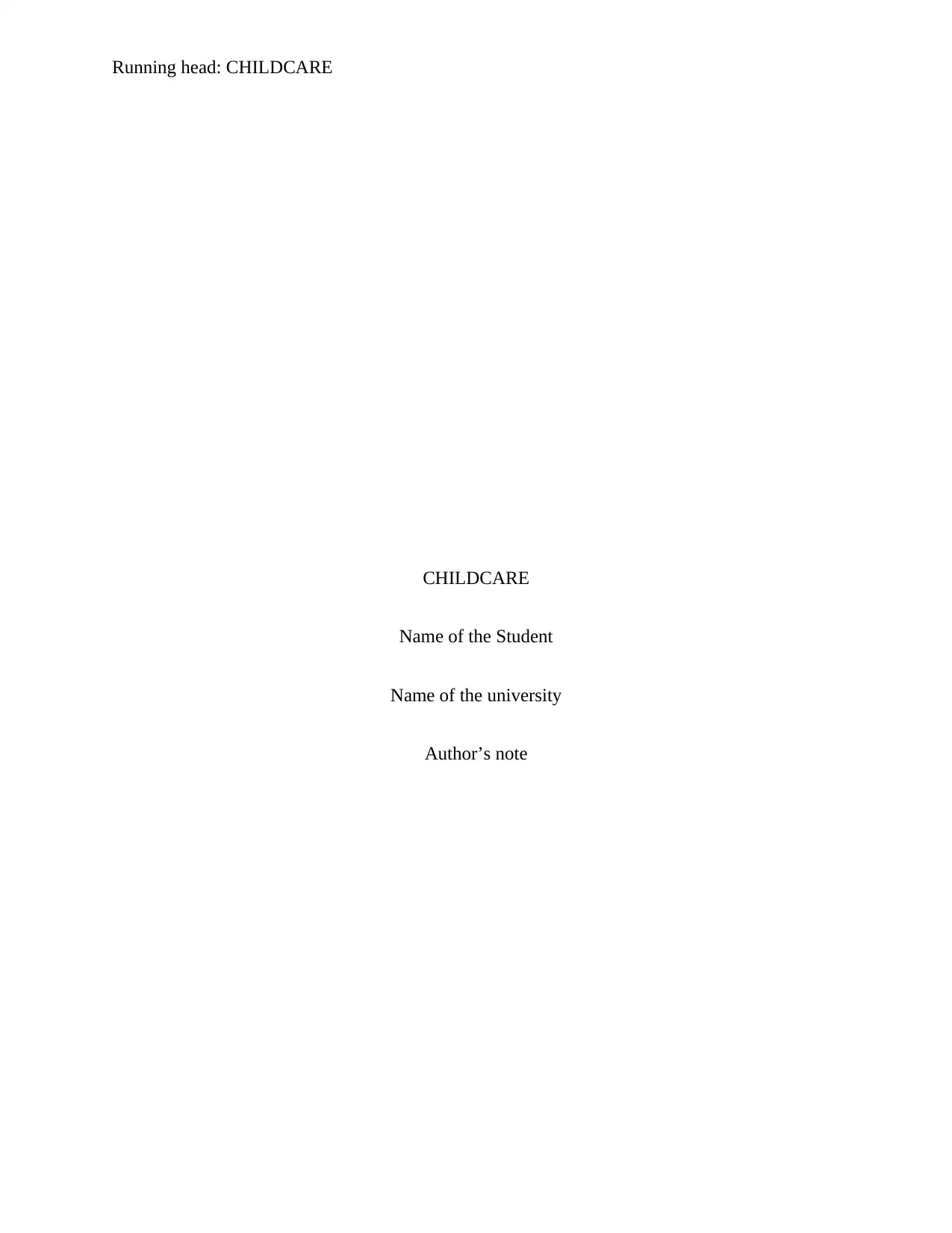
Running head: CHILDCARE
CHILDCARE
Name of the Student
Name of the university
Author’s note
CHILDCARE
Name of the Student
Name of the university
Author’s note
Paraphrase This Document
Need a fresh take? Get an instant paraphrase of this document with our AI Paraphraser
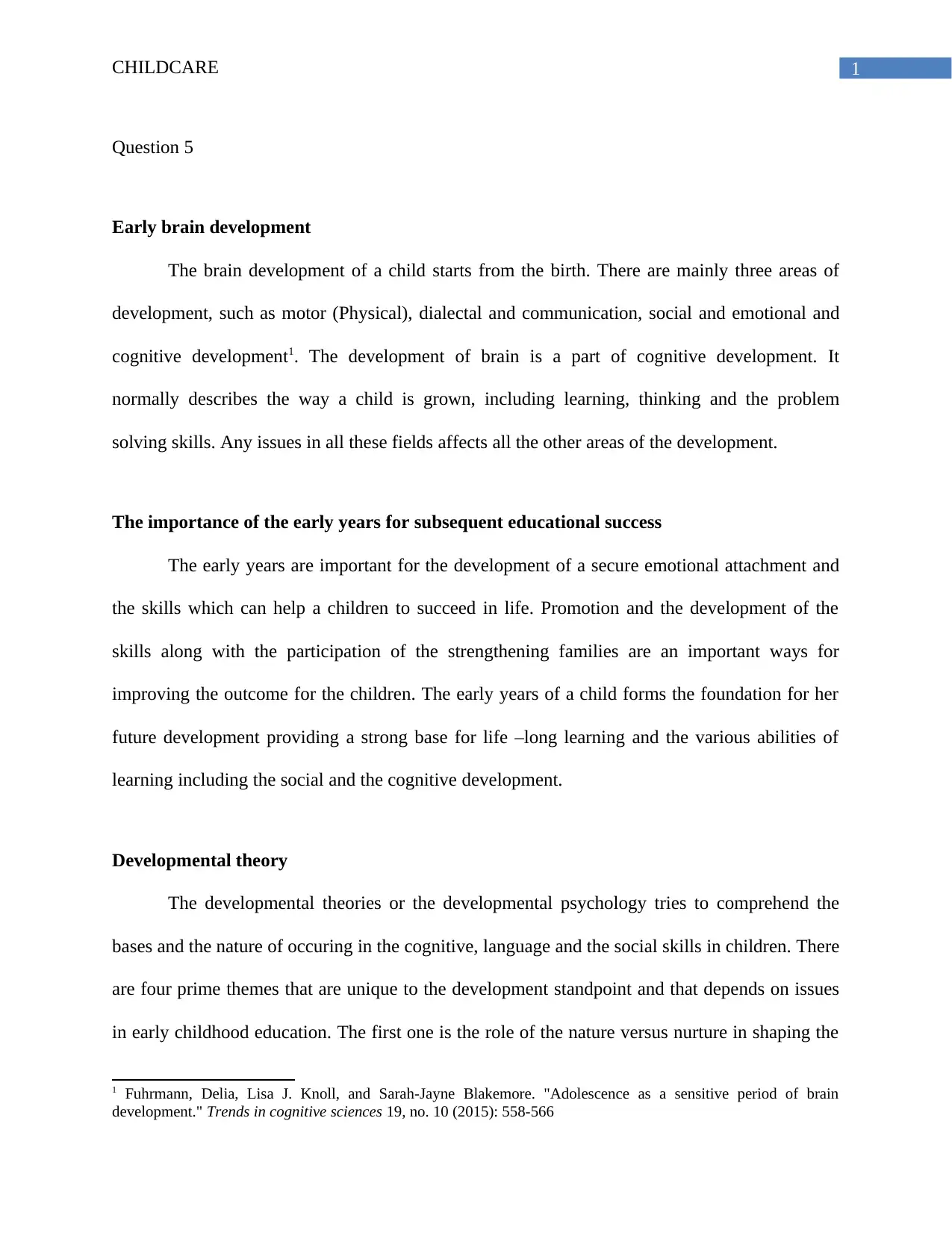
1CHILDCARE
Question 5
Early brain development
The brain development of a child starts from the birth. There are mainly three areas of
development, such as motor (Physical), dialectal and communication, social and emotional and
cognitive development1. The development of brain is a part of cognitive development. It
normally describes the way a child is grown, including learning, thinking and the problem
solving skills. Any issues in all these fields affects all the other areas of the development.
The importance of the early years for subsequent educational success
The early years are important for the development of a secure emotional attachment and
the skills which can help a children to succeed in life. Promotion and the development of the
skills along with the participation of the strengthening families are an important ways for
improving the outcome for the children. The early years of a child forms the foundation for her
future development providing a strong base for life –long learning and the various abilities of
learning including the social and the cognitive development.
Developmental theory
The developmental theories or the developmental psychology tries to comprehend the
bases and the nature of occuring in the cognitive, language and the social skills in children. There
are four prime themes that are unique to the development standpoint and that depends on issues
in early childhood education. The first one is the role of the nature versus nurture in shaping the
1 Fuhrmann, Delia, Lisa J. Knoll, and Sarah-Jayne Blakemore. "Adolescence as a sensitive period of brain
development." Trends in cognitive sciences 19, no. 10 (2015): 558-566
Question 5
Early brain development
The brain development of a child starts from the birth. There are mainly three areas of
development, such as motor (Physical), dialectal and communication, social and emotional and
cognitive development1. The development of brain is a part of cognitive development. It
normally describes the way a child is grown, including learning, thinking and the problem
solving skills. Any issues in all these fields affects all the other areas of the development.
The importance of the early years for subsequent educational success
The early years are important for the development of a secure emotional attachment and
the skills which can help a children to succeed in life. Promotion and the development of the
skills along with the participation of the strengthening families are an important ways for
improving the outcome for the children. The early years of a child forms the foundation for her
future development providing a strong base for life –long learning and the various abilities of
learning including the social and the cognitive development.
Developmental theory
The developmental theories or the developmental psychology tries to comprehend the
bases and the nature of occuring in the cognitive, language and the social skills in children. There
are four prime themes that are unique to the development standpoint and that depends on issues
in early childhood education. The first one is the role of the nature versus nurture in shaping the
1 Fuhrmann, Delia, Lisa J. Knoll, and Sarah-Jayne Blakemore. "Adolescence as a sensitive period of brain
development." Trends in cognitive sciences 19, no. 10 (2015): 558-566
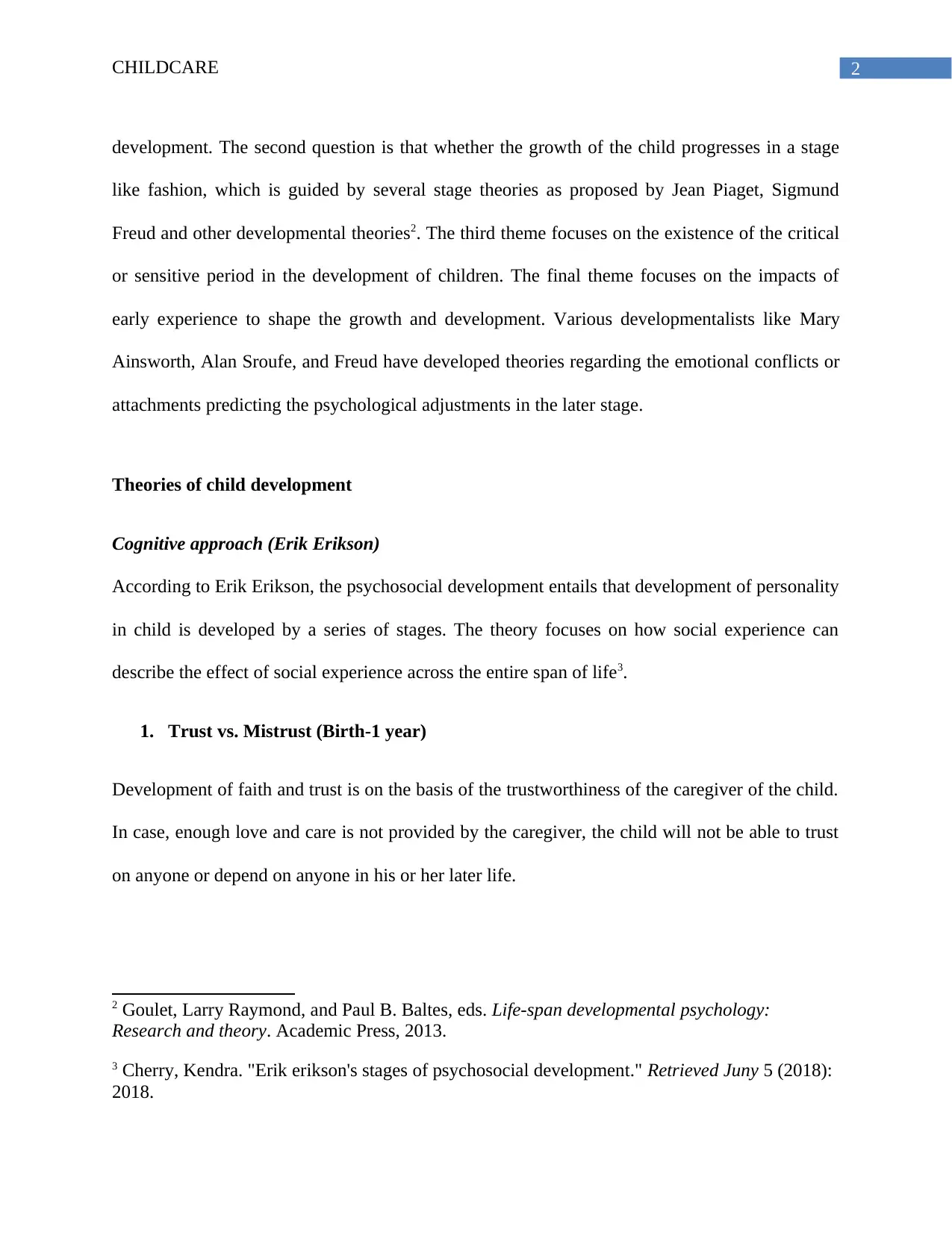
2CHILDCARE
development. The second question is that whether the growth of the child progresses in a stage
like fashion, which is guided by several stage theories as proposed by Jean Piaget, Sigmund
Freud and other developmental theories2. The third theme focuses on the existence of the critical
or sensitive period in the development of children. The final theme focuses on the impacts of
early experience to shape the growth and development. Various developmentalists like Mary
Ainsworth, Alan Sroufe, and Freud have developed theories regarding the emotional conflicts or
attachments predicting the psychological adjustments in the later stage.
Theories of child development
Cognitive approach (Erik Erikson)
According to Erik Erikson, the psychosocial development entails that development of personality
in child is developed by a series of stages. The theory focuses on how social experience can
describe the effect of social experience across the entire span of life3.
1. Trust vs. Mistrust (Birth-1 year)
Development of faith and trust is on the basis of the trustworthiness of the caregiver of the child.
In case, enough love and care is not provided by the caregiver, the child will not be able to trust
on anyone or depend on anyone in his or her later life.
2 Goulet, Larry Raymond, and Paul B. Baltes, eds. Life-span developmental psychology:
Research and theory. Academic Press, 2013.
3 Cherry, Kendra. "Erik erikson's stages of psychosocial development." Retrieved Juny 5 (2018):
2018.
development. The second question is that whether the growth of the child progresses in a stage
like fashion, which is guided by several stage theories as proposed by Jean Piaget, Sigmund
Freud and other developmental theories2. The third theme focuses on the existence of the critical
or sensitive period in the development of children. The final theme focuses on the impacts of
early experience to shape the growth and development. Various developmentalists like Mary
Ainsworth, Alan Sroufe, and Freud have developed theories regarding the emotional conflicts or
attachments predicting the psychological adjustments in the later stage.
Theories of child development
Cognitive approach (Erik Erikson)
According to Erik Erikson, the psychosocial development entails that development of personality
in child is developed by a series of stages. The theory focuses on how social experience can
describe the effect of social experience across the entire span of life3.
1. Trust vs. Mistrust (Birth-1 year)
Development of faith and trust is on the basis of the trustworthiness of the caregiver of the child.
In case, enough love and care is not provided by the caregiver, the child will not be able to trust
on anyone or depend on anyone in his or her later life.
2 Goulet, Larry Raymond, and Paul B. Baltes, eds. Life-span developmental psychology:
Research and theory. Academic Press, 2013.
3 Cherry, Kendra. "Erik erikson's stages of psychosocial development." Retrieved Juny 5 (2018):
2018.
⊘ This is a preview!⊘
Do you want full access?
Subscribe today to unlock all pages.

Trusted by 1+ million students worldwide
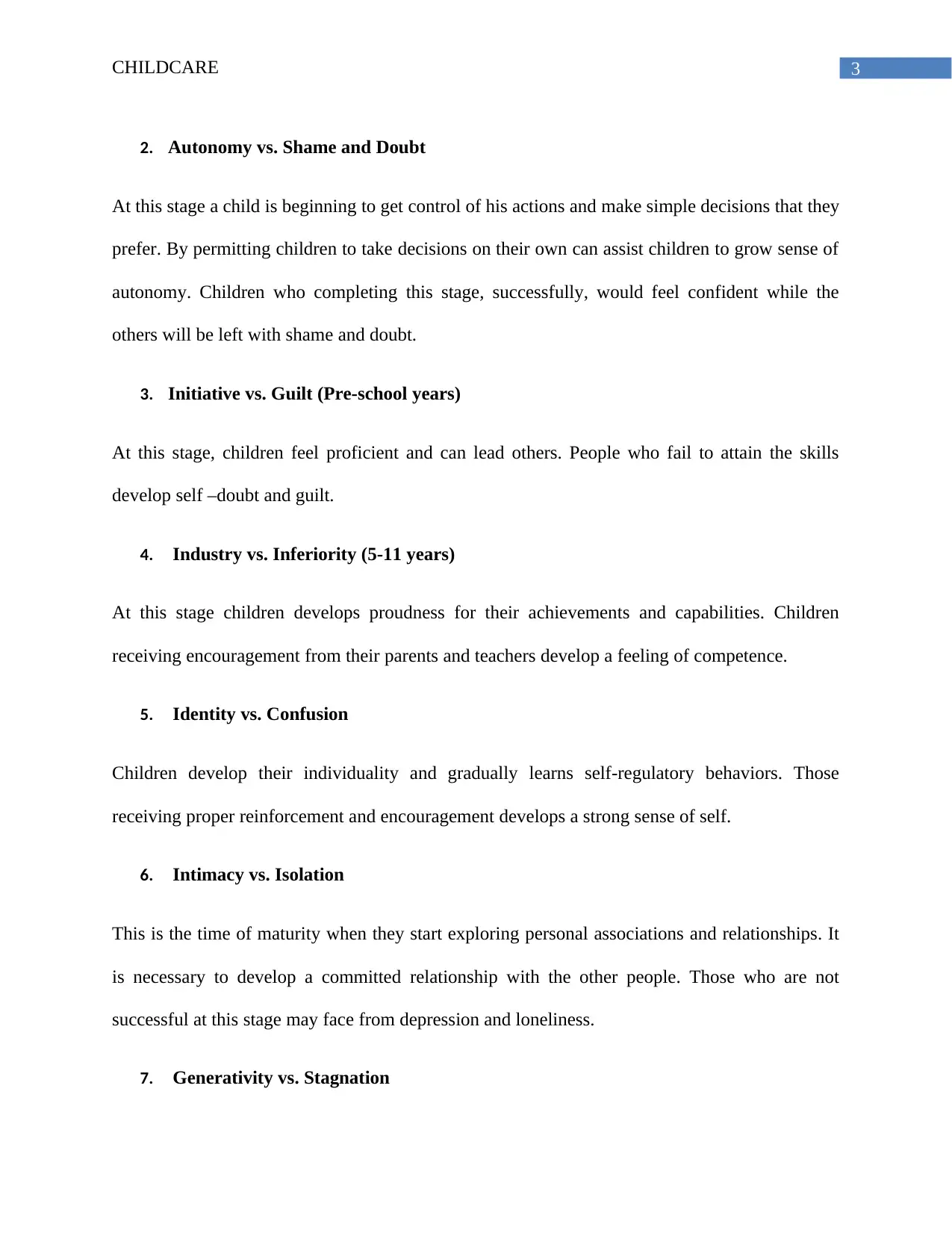
3CHILDCARE
2. Autonomy vs. Shame and Doubt
At this stage a child is beginning to get control of his actions and make simple decisions that they
prefer. By permitting children to take decisions on their own can assist children to grow sense of
autonomy. Children who completing this stage, successfully, would feel confident while the
others will be left with shame and doubt.
3. Initiative vs. Guilt (Pre-school years)
At this stage, children feel proficient and can lead others. People who fail to attain the skills
develop self –doubt and guilt.
4. Industry vs. Inferiority (5-11 years)
At this stage children develops proudness for their achievements and capabilities. Children
receiving encouragement from their parents and teachers develop a feeling of competence.
5. Identity vs. Confusion
Children develop their individuality and gradually learns self-regulatory behaviors. Those
receiving proper reinforcement and encouragement develops a strong sense of self.
6. Intimacy vs. Isolation
This is the time of maturity when they start exploring personal associations and relationships. It
is necessary to develop a committed relationship with the other people. Those who are not
successful at this stage may face from depression and loneliness.
7. Generativity vs. Stagnation
2. Autonomy vs. Shame and Doubt
At this stage a child is beginning to get control of his actions and make simple decisions that they
prefer. By permitting children to take decisions on their own can assist children to grow sense of
autonomy. Children who completing this stage, successfully, would feel confident while the
others will be left with shame and doubt.
3. Initiative vs. Guilt (Pre-school years)
At this stage, children feel proficient and can lead others. People who fail to attain the skills
develop self –doubt and guilt.
4. Industry vs. Inferiority (5-11 years)
At this stage children develops proudness for their achievements and capabilities. Children
receiving encouragement from their parents and teachers develop a feeling of competence.
5. Identity vs. Confusion
Children develop their individuality and gradually learns self-regulatory behaviors. Those
receiving proper reinforcement and encouragement develops a strong sense of self.
6. Intimacy vs. Isolation
This is the time of maturity when they start exploring personal associations and relationships. It
is necessary to develop a committed relationship with the other people. Those who are not
successful at this stage may face from depression and loneliness.
7. Generativity vs. Stagnation
Paraphrase This Document
Need a fresh take? Get an instant paraphrase of this document with our AI Paraphraser
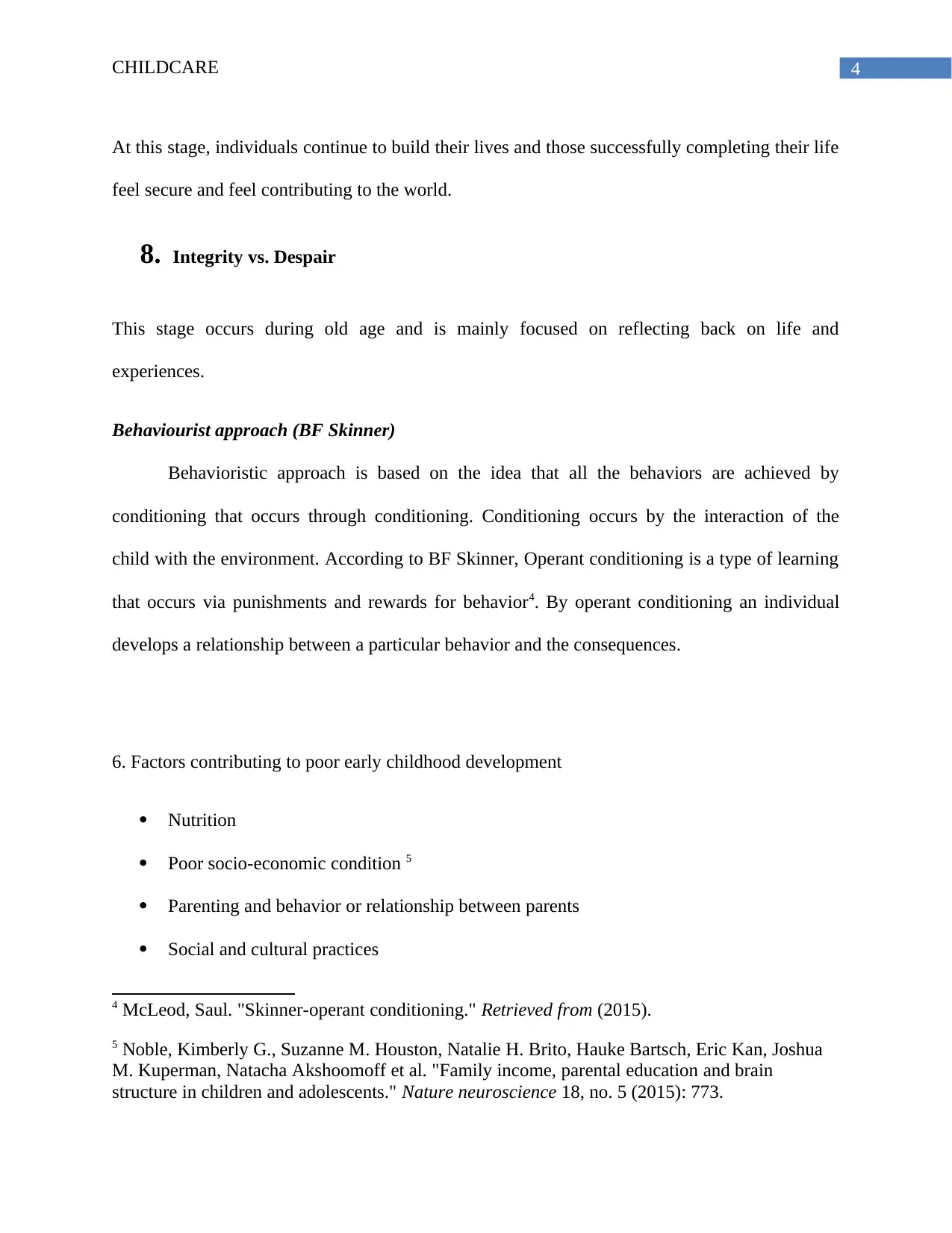
4CHILDCARE
At this stage, individuals continue to build their lives and those successfully completing their life
feel secure and feel contributing to the world.
8. Integrity vs. Despair
This stage occurs during old age and is mainly focused on reflecting back on life and
experiences.
Behaviourist approach (BF Skinner)
Behavioristic approach is based on the idea that all the behaviors are achieved by
conditioning that occurs through conditioning. Conditioning occurs by the interaction of the
child with the environment. According to BF Skinner, Operant conditioning is a type of learning
that occurs via punishments and rewards for behavior4. By operant conditioning an individual
develops a relationship between a particular behavior and the consequences.
6. Factors contributing to poor early childhood development
Nutrition
Poor socio-economic condition 5
Parenting and behavior or relationship between parents
Social and cultural practices
4 McLeod, Saul. "Skinner-operant conditioning." Retrieved from (2015).
5 Noble, Kimberly G., Suzanne M. Houston, Natalie H. Brito, Hauke Bartsch, Eric Kan, Joshua
M. Kuperman, Natacha Akshoomoff et al. "Family income, parental education and brain
structure in children and adolescents." Nature neuroscience 18, no. 5 (2015): 773.
At this stage, individuals continue to build their lives and those successfully completing their life
feel secure and feel contributing to the world.
8. Integrity vs. Despair
This stage occurs during old age and is mainly focused on reflecting back on life and
experiences.
Behaviourist approach (BF Skinner)
Behavioristic approach is based on the idea that all the behaviors are achieved by
conditioning that occurs through conditioning. Conditioning occurs by the interaction of the
child with the environment. According to BF Skinner, Operant conditioning is a type of learning
that occurs via punishments and rewards for behavior4. By operant conditioning an individual
develops a relationship between a particular behavior and the consequences.
6. Factors contributing to poor early childhood development
Nutrition
Poor socio-economic condition 5
Parenting and behavior or relationship between parents
Social and cultural practices
4 McLeod, Saul. "Skinner-operant conditioning." Retrieved from (2015).
5 Noble, Kimberly G., Suzanne M. Houston, Natalie H. Brito, Hauke Bartsch, Eric Kan, Joshua
M. Kuperman, Natacha Akshoomoff et al. "Family income, parental education and brain
structure in children and adolescents." Nature neuroscience 18, no. 5 (2015): 773.
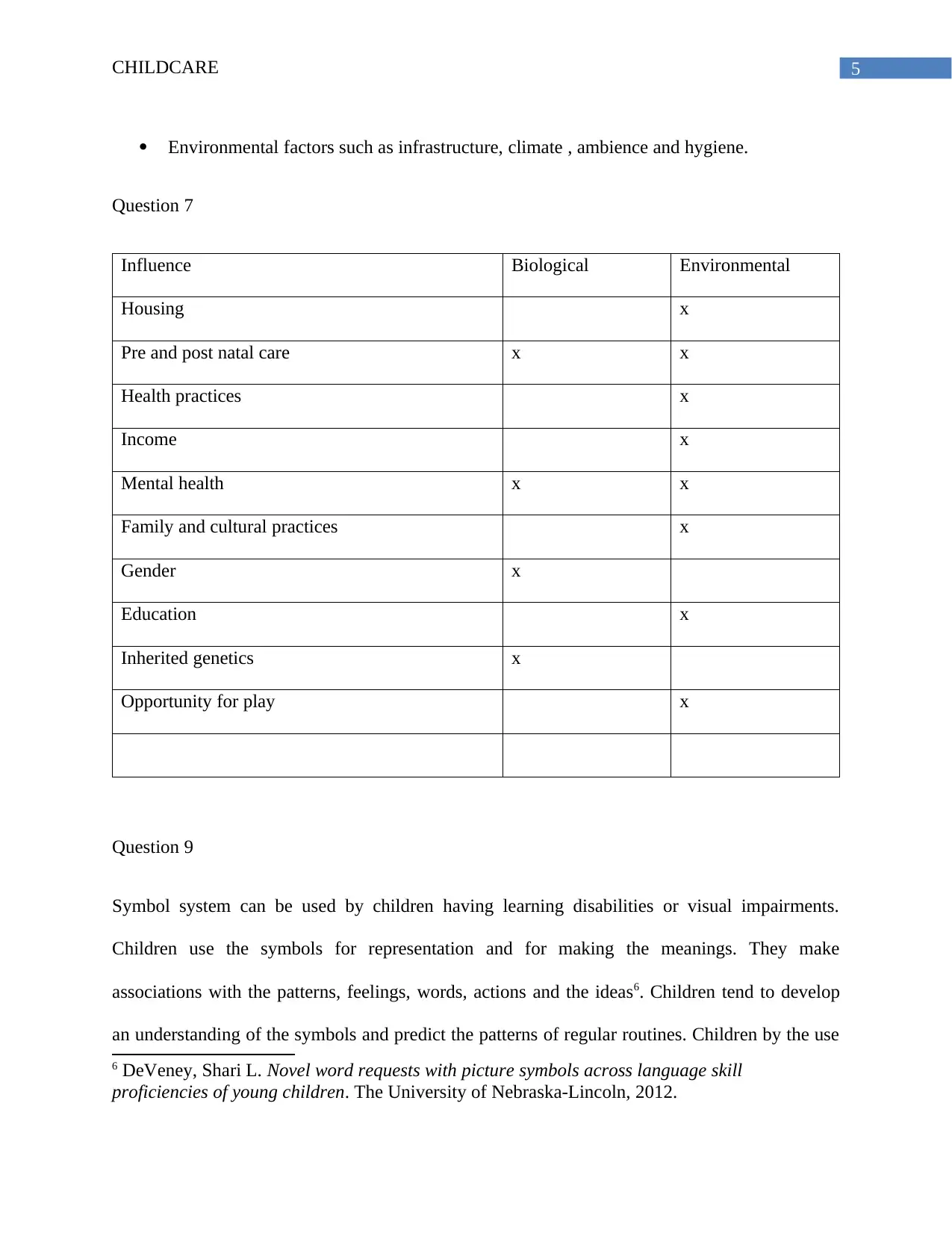
5CHILDCARE
Environmental factors such as infrastructure, climate , ambience and hygiene.
Question 7
Influence Biological Environmental
Housing x
Pre and post natal care x x
Health practices x
Income x
Mental health x x
Family and cultural practices x
Gender x
Education x
Inherited genetics x
Opportunity for play x
Question 9
Symbol system can be used by children having learning disabilities or visual impairments.
Children use the symbols for representation and for making the meanings. They make
associations with the patterns, feelings, words, actions and the ideas6. Children tend to develop
an understanding of the symbols and predict the patterns of regular routines. Children by the use
6 DeVeney, Shari L. Novel word requests with picture symbols across language skill
proficiencies of young children. The University of Nebraska-Lincoln, 2012.
Environmental factors such as infrastructure, climate , ambience and hygiene.
Question 7
Influence Biological Environmental
Housing x
Pre and post natal care x x
Health practices x
Income x
Mental health x x
Family and cultural practices x
Gender x
Education x
Inherited genetics x
Opportunity for play x
Question 9
Symbol system can be used by children having learning disabilities or visual impairments.
Children use the symbols for representation and for making the meanings. They make
associations with the patterns, feelings, words, actions and the ideas6. Children tend to develop
an understanding of the symbols and predict the patterns of regular routines. Children by the use
6 DeVeney, Shari L. Novel word requests with picture symbols across language skill
proficiencies of young children. The University of Nebraska-Lincoln, 2012.
⊘ This is a preview!⊘
Do you want full access?
Subscribe today to unlock all pages.

Trusted by 1+ million students worldwide
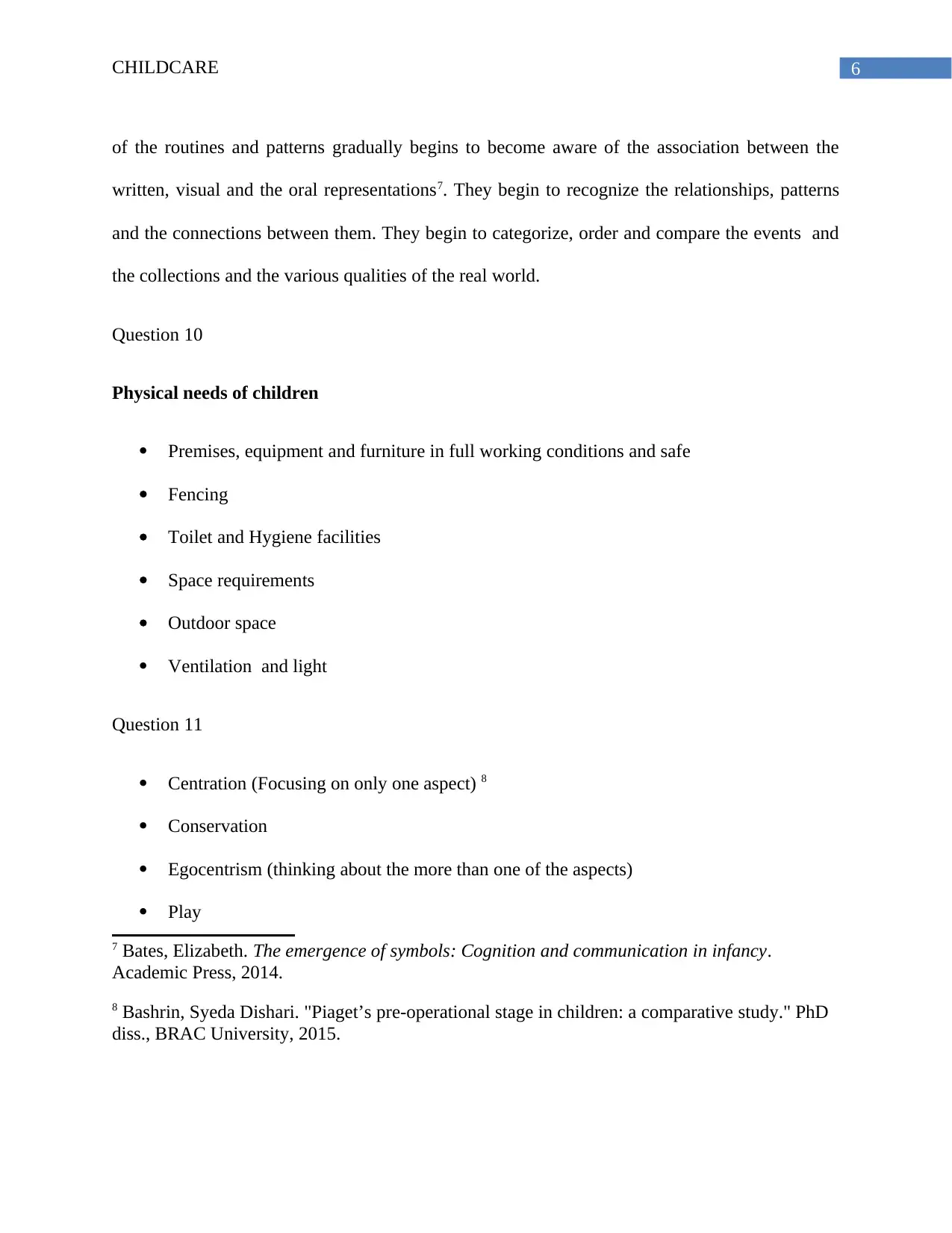
6CHILDCARE
of the routines and patterns gradually begins to become aware of the association between the
written, visual and the oral representations7. They begin to recognize the relationships, patterns
and the connections between them. They begin to categorize, order and compare the events and
the collections and the various qualities of the real world.
Question 10
Physical needs of children
Premises, equipment and furniture in full working conditions and safe
Fencing
Toilet and Hygiene facilities
Space requirements
Outdoor space
Ventilation and light
Question 11
Centration (Focusing on only one aspect) 8
Conservation
Egocentrism (thinking about the more than one of the aspects)
Play
7 Bates, Elizabeth. The emergence of symbols: Cognition and communication in infancy.
Academic Press, 2014.
8 Bashrin, Syeda Dishari. "Piaget’s pre-operational stage in children: a comparative study." PhD
diss., BRAC University, 2015.
of the routines and patterns gradually begins to become aware of the association between the
written, visual and the oral representations7. They begin to recognize the relationships, patterns
and the connections between them. They begin to categorize, order and compare the events and
the collections and the various qualities of the real world.
Question 10
Physical needs of children
Premises, equipment and furniture in full working conditions and safe
Fencing
Toilet and Hygiene facilities
Space requirements
Outdoor space
Ventilation and light
Question 11
Centration (Focusing on only one aspect) 8
Conservation
Egocentrism (thinking about the more than one of the aspects)
Play
7 Bates, Elizabeth. The emergence of symbols: Cognition and communication in infancy.
Academic Press, 2014.
8 Bashrin, Syeda Dishari. "Piaget’s pre-operational stage in children: a comparative study." PhD
diss., BRAC University, 2015.
Paraphrase This Document
Need a fresh take? Get an instant paraphrase of this document with our AI Paraphraser

7CHILDCARE
Symbolic representation of objects
Animism (concept that inanimate objects have emotions and feelings)
Artificialism
Irreversibility
Symbolic play
Lack of concrete thinking
Symbolic representation of objects
Animism (concept that inanimate objects have emotions and feelings)
Artificialism
Irreversibility
Symbolic play
Lack of concrete thinking
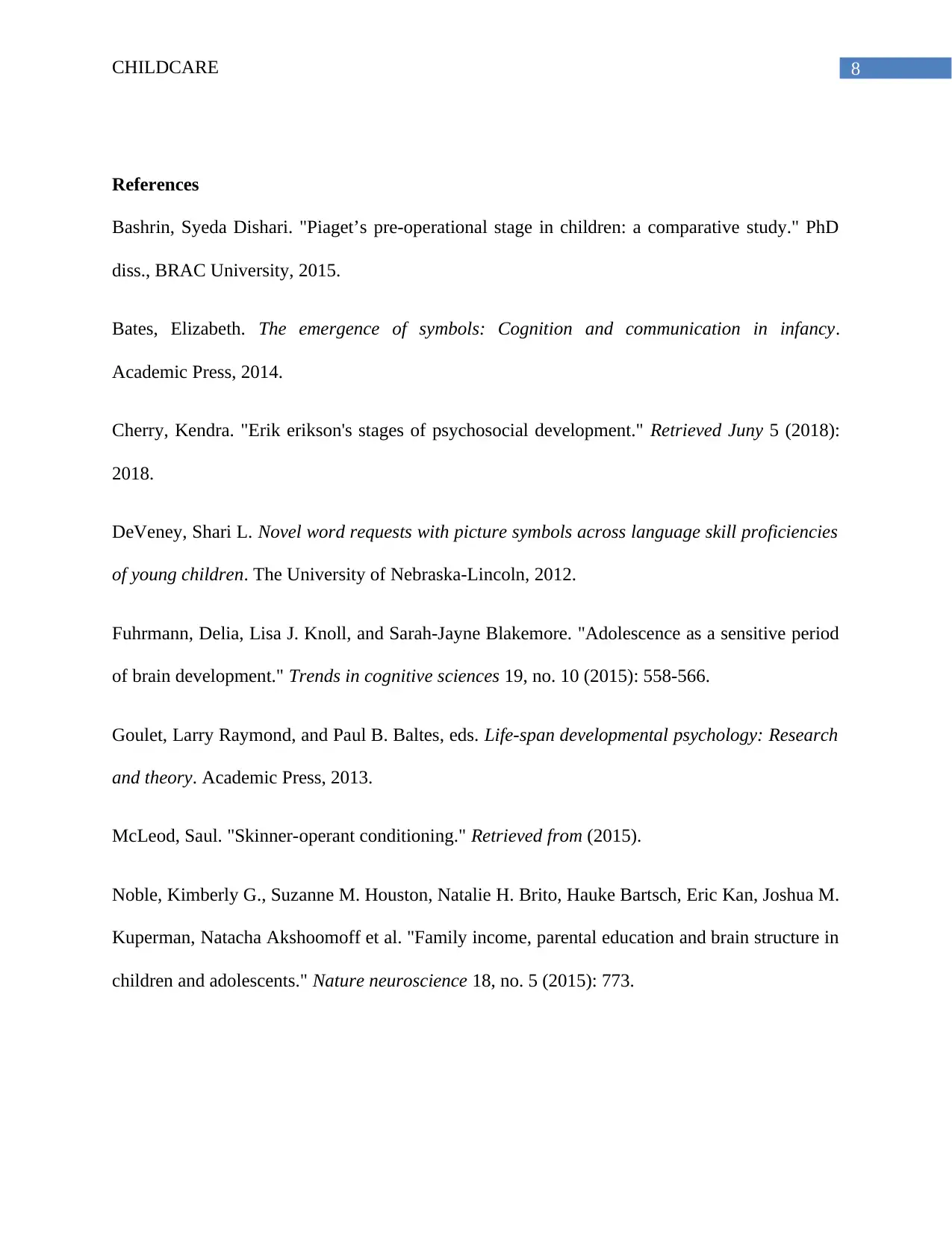
8CHILDCARE
References
Bashrin, Syeda Dishari. "Piaget’s pre-operational stage in children: a comparative study." PhD
diss., BRAC University, 2015.
Bates, Elizabeth. The emergence of symbols: Cognition and communication in infancy.
Academic Press, 2014.
Cherry, Kendra. "Erik erikson's stages of psychosocial development." Retrieved Juny 5 (2018):
2018.
DeVeney, Shari L. Novel word requests with picture symbols across language skill proficiencies
of young children. The University of Nebraska-Lincoln, 2012.
Fuhrmann, Delia, Lisa J. Knoll, and Sarah-Jayne Blakemore. "Adolescence as a sensitive period
of brain development." Trends in cognitive sciences 19, no. 10 (2015): 558-566.
Goulet, Larry Raymond, and Paul B. Baltes, eds. Life-span developmental psychology: Research
and theory. Academic Press, 2013.
McLeod, Saul. "Skinner-operant conditioning." Retrieved from (2015).
Noble, Kimberly G., Suzanne M. Houston, Natalie H. Brito, Hauke Bartsch, Eric Kan, Joshua M.
Kuperman, Natacha Akshoomoff et al. "Family income, parental education and brain structure in
children and adolescents." Nature neuroscience 18, no. 5 (2015): 773.
References
Bashrin, Syeda Dishari. "Piaget’s pre-operational stage in children: a comparative study." PhD
diss., BRAC University, 2015.
Bates, Elizabeth. The emergence of symbols: Cognition and communication in infancy.
Academic Press, 2014.
Cherry, Kendra. "Erik erikson's stages of psychosocial development." Retrieved Juny 5 (2018):
2018.
DeVeney, Shari L. Novel word requests with picture symbols across language skill proficiencies
of young children. The University of Nebraska-Lincoln, 2012.
Fuhrmann, Delia, Lisa J. Knoll, and Sarah-Jayne Blakemore. "Adolescence as a sensitive period
of brain development." Trends in cognitive sciences 19, no. 10 (2015): 558-566.
Goulet, Larry Raymond, and Paul B. Baltes, eds. Life-span developmental psychology: Research
and theory. Academic Press, 2013.
McLeod, Saul. "Skinner-operant conditioning." Retrieved from (2015).
Noble, Kimberly G., Suzanne M. Houston, Natalie H. Brito, Hauke Bartsch, Eric Kan, Joshua M.
Kuperman, Natacha Akshoomoff et al. "Family income, parental education and brain structure in
children and adolescents." Nature neuroscience 18, no. 5 (2015): 773.
⊘ This is a preview!⊘
Do you want full access?
Subscribe today to unlock all pages.

Trusted by 1+ million students worldwide
1 out of 9
Related Documents
Your All-in-One AI-Powered Toolkit for Academic Success.
+13062052269
info@desklib.com
Available 24*7 on WhatsApp / Email
![[object Object]](/_next/static/media/star-bottom.7253800d.svg)
Unlock your academic potential
Copyright © 2020–2026 A2Z Services. All Rights Reserved. Developed and managed by ZUCOL.





